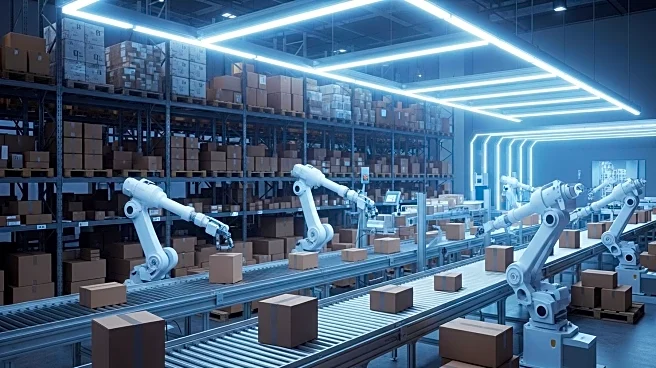What's Happening?
The recent decision by the US to end the de minimis tariff exemption on packages under $800 has significantly disrupted global shipping, affecting small package trade. This change has led to postal operators across Europe, Asia, and the Pacific suspending deliveries to the US, resulting in backlogs and surges in returns. E-commerce retailers and warehouse operators are facing challenges as supply chains become fragile due to these disruptions. Automation, particularly AI-driven robotics with human-in-the-loop systems, is emerging as a crucial stabilizing force, allowing warehouses to manage unpredictable spikes in volume effectively. The removal of the de minimis exemption has increased import duties, leading to higher costs for importers and causing international postal services to suspend US deliveries.
Why It's Important?
The disruption in global shipping due to tariff changes has significant implications for US industries, particularly e-commerce and logistics. The increased import duties raise costs for businesses, affecting their margins and operational efficiency. Automation in warehouses is becoming increasingly important as it provides a way to manage surges in volume without overwhelming human labor capacity. This shift towards automation is crucial for maintaining stability in supply chains and ensuring that goods continue to move efficiently despite global trade uncertainties. The financial rationale for automation is strengthened by the volatility in trade, as it helps offset increased costs and improves throughput and error rates.
What's Next?
As global trade remains uncertain, warehouses must prepare for ongoing disruptions due to tariffs, geopolitical tensions, and supply-demand imbalances. The integration of AI, robotics, and human expertise offers a path forward, allowing warehouses to absorb shocks without losing momentum. The market for warehouse automation is expected to grow rapidly, with significant investments in new AI tools. These advances will likely make automation a core component of resilient supply chains in the future.
Beyond the Headlines
The broader implications of these developments include a shift towards more resilient supply chain management practices. Automation not only improves operational efficiency but also enhances the ability to forecast demand accurately, reducing shortages and overstock. The blend of machine consistency and human judgment in warehouse operations provides a robust framework for managing complex and volatile environments, ensuring that businesses can adapt to changing conditions effectively.









